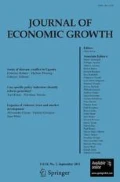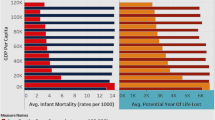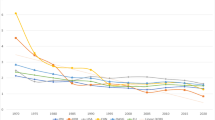Abstract
We examine how the interaction between education and corruption affects institutional reform and economic development. While corruption reduces average income and education, education increases not only output and hence potential corruption rents, but also produces more informed electorates that better monitor government actions. We find that economies with intermediate levels of education remain in a poverty trap since the level of skills creates sufficient corruption rents but not enough monitoring. Economies with low or high levels of education can escape the poverty trap, and inequality plays a key role in determining whether this occurs through a change in institutions or an expansion of education.
Similar content being viewed by others
References
Acemoglu D., Robinson J. A. (2000) Why did the west extend the Franchise? Democracy, inequality, and growth in historical perspective. Quarterly Journal of Economics 115: 1167–1199
Acemoglu D., Robinson J. A. (2006) Economic origins of dictatorship and democracy. Cambridge University press, Cambridge
Acemoglu D., Robinson J. A. (2008) Persistence of power, elites, and institutions. American Economic Review 98: 267–293
Acemoglu D., Johnson S., Robinson J. A. (2003) An African success story: Botswana. In: Rodrik D. (eds) In search of prosperity: Analytic narratives on economic growth. Princeton University Press, Princeton, NY
Aghion P., Alberto A., Trebbi F. (2004) Endogenous political institutions. Quarterly Journal of Economics 119: 565–611
Aghion P., Caroli E., García-Peñalosa C. (1999) Inequality and economic growth: The perspective of the new growth theories. Journal of Economic Literature 37: 1615–1660
Alesina A. (1988) Credibility and policy convergence in a two party system. American Economic Review 78: 796–805
Alesina A., Angeletos G.-M. (2005) Corruption, inequality and fairness. Journal of Monetary Economics 52: 1227–1244
Alesina A., Hausmann R., Hommes R., Stein E. (1999) Budget institutions and fiscal performance in Latin America. Journal of Development Economics 59: 253–273
Alesina A., Spear S. (1988) An overlapping generations model of electoral competition. Journal of Public Economics 37: 359–379
American Political Science Association Task Force (2004) American democracy in an age of rising inequality. Report of the American political science association task force on inequality and American democracy. Perspectives on Politics 2: 651–666
Bardhan P. (1997) Corruption and development: A review of issues. Journal of Economic Perspectives 35: 1320–1346
Barro R. J., Lee J.-W. (2001) International data on educational attainment: Updates and implications. Oxford Economic Papers 53: 541–563
Benabou R. (1996) Inequality and growth. NBER Macroeconomics Annual 11: 11–74
Besley T. (2006) Principled agents. The Political Economy of Good Government. Oxford University Press, Oxford
Bourguignon F., Verdier T. (2000) Oligarchy, democracy, inequality and growth. Journal of Development Economics 62: 285–313
Brender B., Lott J. R. (1996) Legislator voter and shirking: A critical review of the literature. Public Choice 87: 67–100
Bulte E. H., Damania R., Deacon R. T. (2005) Resource intensity, institutions, and development. World Development 33: 1029–1044
Cervellati M., Sunde U., Fortunato P. (2006) A dynamic theory of endogenous political institutions. In: Eicher T., García-Peñalosa C. (eds) Institutions, development, and economic growth. MIT Press, Cambridge, MA
Chong A., Gradstein M. (2007) Inequality and institutions. Review of Economics and Statistics 89: 454–465
De la Croix D., Delavallade C. (2009) Growth, public investment and corruption with failing institutions. Economics of Governance 10: 187–219
De la Croix D., Doepke M. (2009) To segregate or to integrate: Education politics and democracy. Review of Economic Studies 76: 579–628
Delli Carpini M. X., Keeter S. (1996) What Americans know about politics and why it matters. Yale University Press, New Haven, CT
Downs A. (1957) An economic theory of democracy. Harper & Row, New York
Easterly W. (2007) Inequality does cause underdevelopment. Journal of Development Economics 84: 755–776
Ehrlich I., Lui F. T. (1999) Bureaucratic corruption and endogenous economic growth. Journal of Political Economy 107: S270–S293
Fernandez R., Rogerson R. (1995) On the political economy of education subsidies. Review of Economic Studies 62: 249–262
Galor O., Moav O. (2004) From physical to human capital: Inequality in the process of development. Review of Economic Studies 71: 1001–1026
Galor O., Moav O. (2006) Das human-kapital: A theory of the demise of the class structure. Review of Economic Studies 73: 85–117
Galor O., Moav O., Vollrath D. (2009) Inequality in land ownership, the emergence of human capital promoting institutions and the great divergence. Review of Economic Studies 76: 143–179
Galor O., Zeira J. (1993) Income distribution and macroeconomics. Review of Economic Studies 60: 35–52
Galston W. A. (2001) Political knowledge, political engagement, and civic education. Annual Review of Political Science 4: 217–234
García-Peñalosa C., Turnovsky S. J. (2005) Second-best optimal taxation in a developing economy. Journal of Public Economics 89: 1045–1074
Glaeser E. L., La Porta R., Lopez-de-Silanes F., Shleifer A. (2004) Do Institutions cause growth?. Journal of Economic Growth 9: 271–303
Glaeser E. L., Ponzetto G. A. M., Shleifer A. (2007) Why does democracy need education?. Journal of Economic Growth 12: 77–99
Glaeser E. L., Saks R. (2006) Corruption in America. Journal of Public Economics 90: 1053–1072
Hance W. A. (1956) Economic development in tropical Africa. American Economic Review 46: 441–451
Inglehart R., Catterberg G. (2002) Trends in political action: The developmental trend and the post-honeymoon decline. International Journal of Comparative Sociology 43: 300–316
Jain A. K. (2001) Corruption: A review. Journal of Economic Surveys 15: 71–121
Krueger A. O. (1974) The political economy of the rent-seeking society. American Economic Review 64: 291–303
Mauro P. (1995) Corruption and growth. Quarterly Journal of Economics 110: 681–712
Mauro P. (1997) The effects of corruption on growth, investment and government expenditure. In: Elliot K. (eds) Corruption and the global economy. Institute for International Economics, Washington DC, pp 83–107
Meade J. E. (1961) The economics and social structure of Mauritius—Report to the government of Mauritius. Methuen Press, London
Nie N. H., Junn J., Stehlik-Barry K. (1996) Education and democratic citizenship in America. University of Chicago Press, Chicago
OECD (2007) Specialised anti–corruption institutions: A review of models. OECD, Paris
Parker G. (2005) Reputational capital, opportunism, and self-policing in legislatures. Public Choice 122: 333–354
Persson T., Roland G., Tabellini G. (1997) Separation of powers and political accountability. Quarterly Journal of Economics 112: 1163–1202
Popkin S. L., Dimock M. A. (1999) Political knowledge and citizen competence. In: Elkin S. K., Soltan K. E. (eds) Citizen competence and democratic institutions. Pennsylvania State University Press, University Park, pp 117–146
Robinson J. A., Torvik R., Verdier T. (2006) Political foundations of the resource curse. Journal of Development Economics 79: 447–468
Rogoff K. (1990) Equilibrium political budget cycles. The American Economic Review 80: 21–36
Sokoloff K. L., Engerman S. L. (2000) Institutions, factor endowments, and paths of development in the new world. Journal of Economic Perspectives 14: 217–232
Subramanian, A., & Roy, D. (2003). Who can explain the Mauritian miracle: Meade, Romer, Sachs, or Rodrik? In D. Rodrik (Ed.), In search of prosperity: Analytic narratives on economic growth. Princeton, NJ: Princeton University Press.
Subramanian A., Roy D. (2003) Who can explain the Mauritian miracle: Meade, Romer, Sachs, or Rodrik?. In: Rodrik D. (eds) In search of prosperity: Analytic narratives on economic growth. Princeton University Press, Princeton, NJ
Tanzi V. (1998) Corruption around the world: Causes, consequences, scope and cures. IMF Staff Papers 45: 1–16
Tanzi V. (2000) Policies, institutions and the dark side of economics. Edward Elgar, Northampton, MA and Cheltenham UK
Temple J. (1999) The new growth evidence. Journal of Economic Literature 37: 112–156
Wallis J. J. (2005) Constitutions, corporations, and corruption: American states and institutional change, 1842 to 1852. Journal of Economic History 65: 211–256
Whitehead C. W. (2003) Colonial educators: The British Indian and colonial educational service, 1858–1983. I. B. Tauris, London and New York
Author information
Authors and Affiliations
Corresponding author
Additional information
We are grateful to seminar participants at the European University Institute, GREQAM, the Paris School of Economics, the University Carlos III of Madrid, and the 2007 PEGNet conference, as well as to four anonymous referees and the editor of this journal. This work was partly supported by the French National Research Agency Grant ANR-08-BLAN-0245-01.
Rights and permissions
About this article
Cite this article
Eicher, T., García-Peñalosa, C. & van Ypersele, T. Education, corruption, and the distribution of income. J Econ Growth 14, 205–231 (2009). https://doi.org/10.1007/s10887-009-9043-0
Published:
Issue Date:
DOI: https://doi.org/10.1007/s10887-009-9043-0




